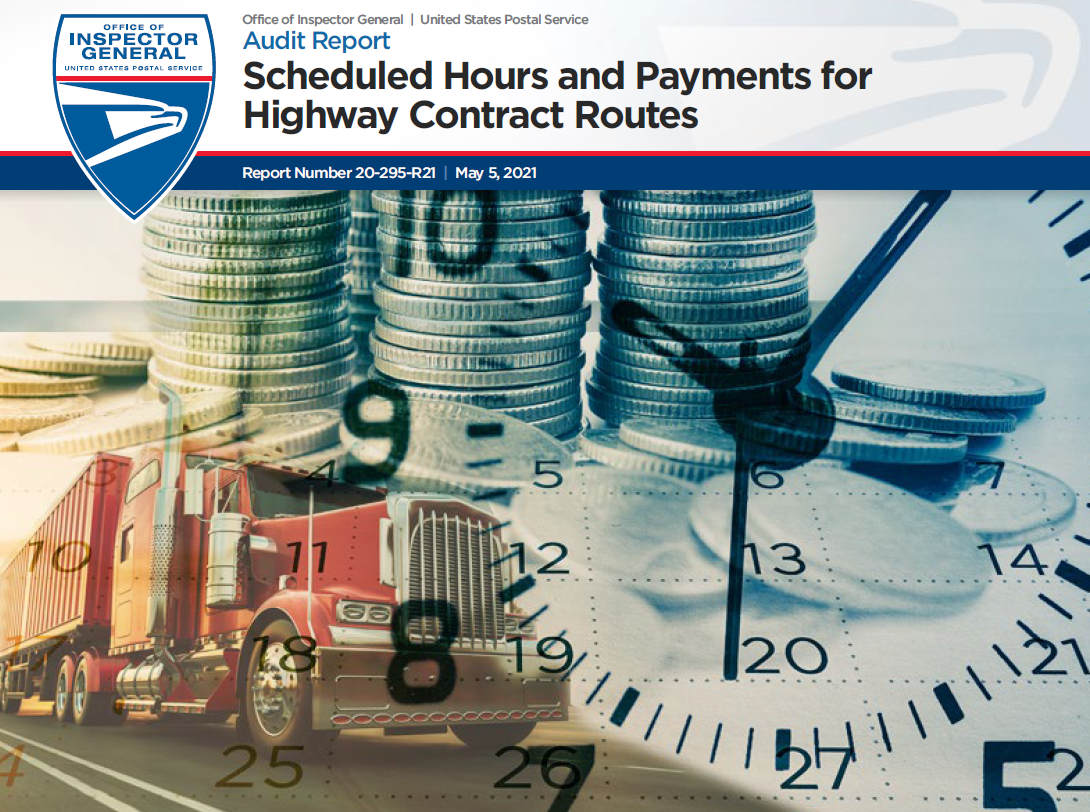
Objective
Our objective was to determine the accuracy of Postal Service Highway Contract Route (HCR) scheduled hours and payments from fiscal years (FYs) 2016 through 2020.
HCRs are routes serviced by suppliers carrying mail over highways between designated points. These suppliers provide contracted transportation services under specified schedules outlined in the contract terms and conditions. HCR schedules include trip information such as departure and arrival times, service facilities, operating frequencies, and trip mileage and payment terms.
The Transportation Contract Support System (TCSS) is an automated contracting system for administering over 17,500 Postal Service highway transportation contracts. It serves as a management system and repository for all HCR contracts including contract modifications and payments.
The Service Change Request (SCR) system is used for managing and controlling the submittal of requests to change the service, schedule, and vehicle requirements as specified in highway contracts administered through TCSS.
Postal Service management informed us on March 31, 2021, that they are replacing the existing TCSS and SCR systems with the Transportation Management System.
Within the HCR contract’s terms and conditions, the Postal Service estimates the minimum hours to operate HCR trips. Contracts are awarded based on an evaluation of the supplier’s proposals and any further negotiations, which include the costs necessary to accomplish the services and time needed to operate the trips.
When it is determined that changes to schedules are needed, the Postal Service uses the SCR system to generate these changes, which are submitted by administrative officials and approved by SCR coordinators at both the area and headquarters levels. Approved SCRs are sent to contracting personnel for entering the scheduled trip information in TCSS.
We performed a risk assessment of the HCR scheduled trips and determined that of the 82,578 scheduled trips in TCSS from FYs 2016 through 2020, 271 were at high- or medium-risk of their contracted schedules being overstated. We used the average speed of 50 miles per hour from the November 2010 Freight Facts and Figures study issued by the Department of Transportation to calculate trip hours, compared it to the actual trip hours in TCSS, and categorized the differences into high-risk (20 hours or more), medium-risk (five to 20 hours), and low-risk (fewer than five hours). The 271 trips included 130 spotter and shuttle services that we excluded from our review because they do not travel on highways, resulting in 141 at-risk trips for review.
Findings
We found that HCR scheduled hours are generally accurate. However, our review of 141 at-risk trips identified 84 trip schedules from FYs 2016 through 2020 that were inaccurate and resulted in incorrect payments to suppliers. Specifically, we determined that administrative officials manually entered the incorrect day count into the SCR system for the 84 trips. A day count error adds 24 hours to a scheduled trip when an additional day is erroneously added to the trip schedule. The remaining 57 trip schedules were entered correctly.
The Postal Service corrected 82 of the 84 (98 percent) trip errors in the SCR system, which included 19 trips that were corrected during our audit after we notified management. However, the Postal Service had not corrected the remaining two errors (2 percent) as of March 2021; therefore, these contracts continue to be overpaid.
Additionally, the Postal Service did not timely identify and correct errors and initiate recovery of incorrect payments to HCR suppliers as required by the Postal Service’s Supplying Principles & Practices. Specifically, Clause B-64, Section D states that, “the supplier shall upon discovery refund any overpayments made by the Postal Service for service performed, or any payments for service not rendered.” However, as of September 30, 2020, our review of payment information in TCSS indicated the Postal Service negotiated recovery of only $389,000 for five trip errors from FYs 2016 to 2020.
This occurred because errors are not easily identifiable since the trip duration information is not visible during the SCR generation and approval processes. Availability of this information would allow for the identification of erroneous hours before trip schedules are finalized. In addition, the Postal Service did not provide adequate oversight of these processes and did not conduct periodic monitoring to timely detect and correct errors and recover about $4.1 million in estimated overpayments from FYs 2016 to 2020.
We estimated the Postal Service incurred about $809,000 in questioned costs and about $65,000 in funds put to better use annually.
Recommendations
We recommended management:
- Develop and implement periodic reviews to ensure timely detection and correction of trip errors in the SCR system for the scheduled hours and corresponding payments in the TCSS.
- Develop requirements for the new Transportation Management System to include total trip duration details.
- Develop a plan to review the accuracy of previously approved scheduled trips to identify and correct day count errors in the SCR system, determine actual overpayments, initiate recovery, and maintain all supporting documentation in either the TCSS or Transportation Management System.
Read full report
Source: USPS Office of Inspector General
